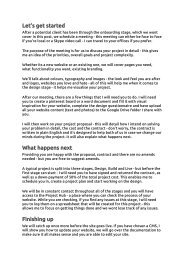BP 2007 Products
You also want an ePaper? Increase the reach of your titles
YUMPU automatically turns print PDFs into web optimized ePapers that Google loves.
Section 12 – Arrival of Vessel, Berth, discharge, etc.<br />
12.1 Arrival of Vessel<br />
The Seller shall arrange for its Vessel to report to the Buyer or its representative at the<br />
Discharge Port in accordance with the standard reporting procedure applicable from time<br />
to time at the Discharge Port.<br />
12.2 Berth<br />
12.2.1 For the discharge of each shipment the Buyer shall provide or cause to be<br />
provided free of charge to the Seller (subject to the provisions of Section 29) a<br />
Berth to be indicated by the Buyer or its representative at which the Vessel can<br />
when fully laden safely reach and leave and where it can always lie Safely Afloat.<br />
12.2.2 Notwithstanding the Buyer’s obligations under 12.2.1, where the Buyer has<br />
purchased the Product on board a named Vessel, the Seller represents to the<br />
Buyer and warrants that the named Vessel can safely Berth and discharge the<br />
contractual quantity of Product at the Discharge Port regardless of whether the<br />
contractual quantity is a whole or part cargo and irrespective of the port<br />
scheduling of the Vessel. Failure to comply with this term shall entitle the Buyer<br />
to refuse to Berth the named Vessel. Any costs incurred by the Seller in<br />
providing a substitute Vessel, or lightering and/or transhipping the Product at the<br />
Discharge Port including demurrage shall be for the account of the Seller.<br />
12.3 Shifting<br />
Save as provided in Section 29.5, the Buyer shall have the right to shift the Vessel from<br />
one Berth to another. Subject to Section 13.3.1.1. all costs, including but not limited to<br />
damages for delay, shall be for the Seller's account if such shifting is due to reasons<br />
within the control of the Seller and/or the Vessel and shall otherwise be for the Buyer’s<br />
account.<br />
12.4 Lightering and Transhipment<br />
12.4.1 Vessels shall not be compelled to lighter at the Discharge Port, but if any<br />
lightering shall be undertaken at the request of the Buyer the expense thereof<br />
shall be for the Buyer's account and all time expended in connection with such<br />
lightering shall count as running hours for the purposes of calculating the liability<br />
for demurrage under the provisions of Section 13.<br />
12.4.2.1 Any lightering operations shall be carried out in accordance with the<br />
procedures set out in the ICS/OCIMF Ship-to-Ship transfer guides.<br />
The lightering Vessel shall be subject to the Seller's prior acceptance.<br />
12.4.2.2 Any ship-to-ship transfer (transhipment) operations shall be carried out<br />
in accordance with the procedures set out in the ICS/OCIMF Ship-to-<br />
Ship transfer guides. The receiving Vessel shall be subject to the<br />
Seller's prior acceptance.<br />
12.4.2.3 Except in relation to any ship-to-ship transfer carried out at the request<br />
of and for the purposes of the Seller, any ship-to-ship transfer<br />
operation shall only be carried out with the Seller’s express consent<br />
and shall only be carried out outside port limits and at the Buyer’s sole<br />
risk and the Buyer shall be liable to the Seller in respect of all time<br />
spent in excess of permitted running hours calculated at the relevant<br />
demurrage rate notwithstanding the Vessel is outside port limits, and<br />
for all and any losses, costs, damages and proceedings arising<br />
therefrom and shall indemnify the Seller in respect thereof. This<br />
Section shall not be included in the scope of Section 33.1.<br />
page 24



